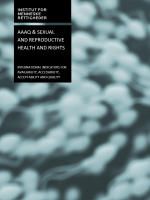
AAAQ & sexual and reproductive health and rights
This paper is an off spring of a collaborative capacity building project; the project partners are: The Danish Family Planning Association (Sex & Samfund), Danish Red Cross, Global Nutrition and Health (Metropolitan University College) and Axis, together with the Danish Institute for Human Rights. Global Focus supported the project.
The paper has two overall purposes; to map out Sexual and Reproductive Health (SRH) services as a sub-area of SRHR to support practical work in this complex and sensitive area, and to develop indicators for each of the SRH service areas, in terms of Availability, Accessibility, Acceptability and Quality-indicators (AAAQ).
This paper is part of the DIHR AAAQ (Availability, Accessibility, Acceptability and Quality) Toolbox that aims to support the operationalisation of the rights to water, sanitation, food, housing, health, and education.
Designed as a multi-stakeholder approach, the AAAQ Toolbox offers common methodologies for all stakeholders as well as tailored tools for states, rights-holders, business, civil society and National Human Rights Institutions (NHRIs).
The project concerns a methodology based on the human rights criteria of Availability, Accessibility, Acceptability and Quality, which are derived directly from International Covenant on Economic, Social and Cultural Rights (ICESCR) and other instruments and authoritative interpretations.
In the context of sexual and reproductive health services, Availability refers to the existence and quantity of health facilities, goods and services.
Accessibility refers to the physical and economic access to health facilities goods and services as well as accessibility on a non-discriminatory basis and with sufficient information.
Acceptability refers to the sensitivity of health facilities, goods and services to culture and medical ethics.
Quality refers to the need of health facilities, goods and services to be scientifically and medically appropriate and of good quality. These human rights standards should be implemented in accordance with key human rights principles such as non-discrimination; participation and empowerment; and accountability and rule of law.
Also read: The AAAQ Framework and the Right to Water - international indicators and The AAAQ Manual and the Right to Water - contextualising indicators.
We strive to make the pdf versions of our publications etc. accessible for screen readers. If you experience any problems, please contact Digital Editor Stine Juhl Nielsen on stni@humanrights.dk
